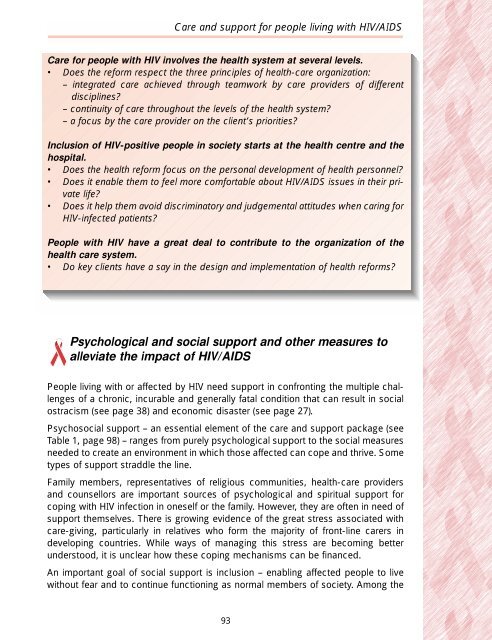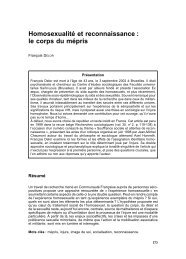Care and support for people living with HIV/AIDS
Care and support for people living with HIV/AIDS
Care and support for people living with HIV/AIDS
You also want an ePaper? Increase the reach of your titles
YUMPU automatically turns print PDFs into web optimized ePapers that Google loves.
<strong>Care</strong> <strong>and</strong> <strong>support</strong> <strong>for</strong> <strong>people</strong> <strong>living</strong> <strong>with</strong> <strong>HIV</strong>/<strong>AIDS</strong><strong>Care</strong> <strong>for</strong> <strong>people</strong> <strong>with</strong> <strong>HIV</strong> involves the health system at several levels.• Does the re<strong>for</strong>m respect the three principles of health-care organization:– integrated care achieved through teamwork by care providers of differentdisciplines?– continuity of care throughout the levels of the health system?– a focus by the care provider on the client’s priorities?Inclusion of <strong>HIV</strong>-positive <strong>people</strong> in society starts at the health centre <strong>and</strong> thehospital.• Does the health re<strong>for</strong>m focus on the personal development of health personnel?• Does it enable them to feel more com<strong>for</strong>table about <strong>HIV</strong>/<strong>AIDS</strong> issues in their privatelife?• Does it help them avoid discriminatory <strong>and</strong> judgemental attitudes when caring <strong>for</strong><strong>HIV</strong>-infected patients?People <strong>with</strong> <strong>HIV</strong> have a great deal to contribute to the organization of thehealth care system.• Do key clients have a say in the design <strong>and</strong> implementation of health re<strong>for</strong>ms?Psychological <strong>and</strong> social <strong>support</strong> <strong>and</strong> other measures toalleviate the impact of <strong>HIV</strong>/<strong>AIDS</strong>People <strong>living</strong> <strong>with</strong> or affected by <strong>HIV</strong> need <strong>support</strong> in confronting the multiple challengesof a chronic, incurable <strong>and</strong> generally fatal condition that can result in socialostracism (see page 38) <strong>and</strong> economic disaster (see page 27).Psychosocial <strong>support</strong> – an essential element of the care <strong>and</strong> <strong>support</strong> package (seeTable 1, page 98) – ranges from purely psychological <strong>support</strong> to the social measuresneeded to create an environment in which those affected can cope <strong>and</strong> thrive. Sometypes of <strong>support</strong> straddle the line.Family members, representatives of religious communities, health-care providers<strong>and</strong> counsellors are important sources of psychological <strong>and</strong> spiritual <strong>support</strong> <strong>for</strong>coping <strong>with</strong> <strong>HIV</strong> infection in oneself or the family. However, they are often in need of<strong>support</strong> themselves. There is growing evidence of the great stress associated <strong>with</strong>care-giving, particularly in relatives who <strong>for</strong>m the majority of front-line carers indeveloping countries. While ways of managing this stress are becoming betterunderstood, it is unclear how these coping mechanisms can be financed.An important goal of social <strong>support</strong> is inclusion – enabling affected <strong>people</strong> to live<strong>with</strong>out fear <strong>and</strong> to continue functioning as normal members of society. Among the93











